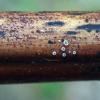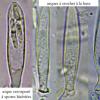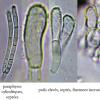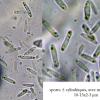
26-02-2026 15:00
Me mandan el material seco de Galicia, recolectada

24-02-2026 11:01
Gernot FriebesHi,found on a branch of Tilia, with conidia measur

23-02-2026 11:22
Thomas Læssøehttps://svampe.databasen.org/observations/10584971

29-11-2024 21:47
Yanick BOULANGERBonjourJ'avais un deuxième échantillon moins mat

07-02-2023 22:28
Ethan CrensonHello friends, On Sunday, in the southern part of

19-02-2026 17:49
Salvador Emilio JoseHola buenas tardes!! Necesito ayuda para la ident

19-02-2026 13:50
Margot en Geert VullingsWe found this collection on deciduous wood on 7-2-
Cistella sur Pteridium aquilinum
Bernard CLESSE,
10-11-2023 22:37
 Une idée de nom pour ce Cistella trouvé sur pétiole pourri de fougère-aigle (Pteridium aquilinum) ?
Une idée de nom pour ce Cistella trouvé sur pétiole pourri de fougère-aigle (Pteridium aquilinum) ?Merci d'avance !
Bernard
Hans-Otto Baral,
11-11-2023 09:34

Re : Cistella sur Pteridium aquilinum
I imagine this is Cistella pteridialis but it is not very different from C. grevillei, which has very similar hairs and spores.
Bernard CLESSE,
11-11-2023 10:36

Re : Cistella sur Pteridium aquilinum
Thank you very much, Zotto !
Bernard
Bernard
Michel Hairaud,
11-11-2023 10:59

Re : Cistella sur Pteridium aquilinum
Bonjour Bernard et Zotto,
From Bernard's images and data, I am not sure to see distinctive characters with C. grevillei ( which seems a complex and found on many sorts of plants) but for the substrate of course.
Is C. pteridialis a now published combination or still a provisional one for Dasyscyphus pteridialis ?
Thanks to you both
AmitiésMichel
From Bernard's images and data, I am not sure to see distinctive characters with C. grevillei ( which seems a complex and found on many sorts of plants) but for the substrate of course.
Is C. pteridialis a now published combination or still a provisional one for Dasyscyphus pteridialis ?
Thanks to you both
AmitiésMichel
Hans-Otto Baral,
11-11-2023 19:01

Re : Cistella sur Pteridium aquilinum
You are right, that combination does not exist. That group requires a genetic study. C. grevillei often reacts IKI-bluish in the medulla or ectal, but not always.



